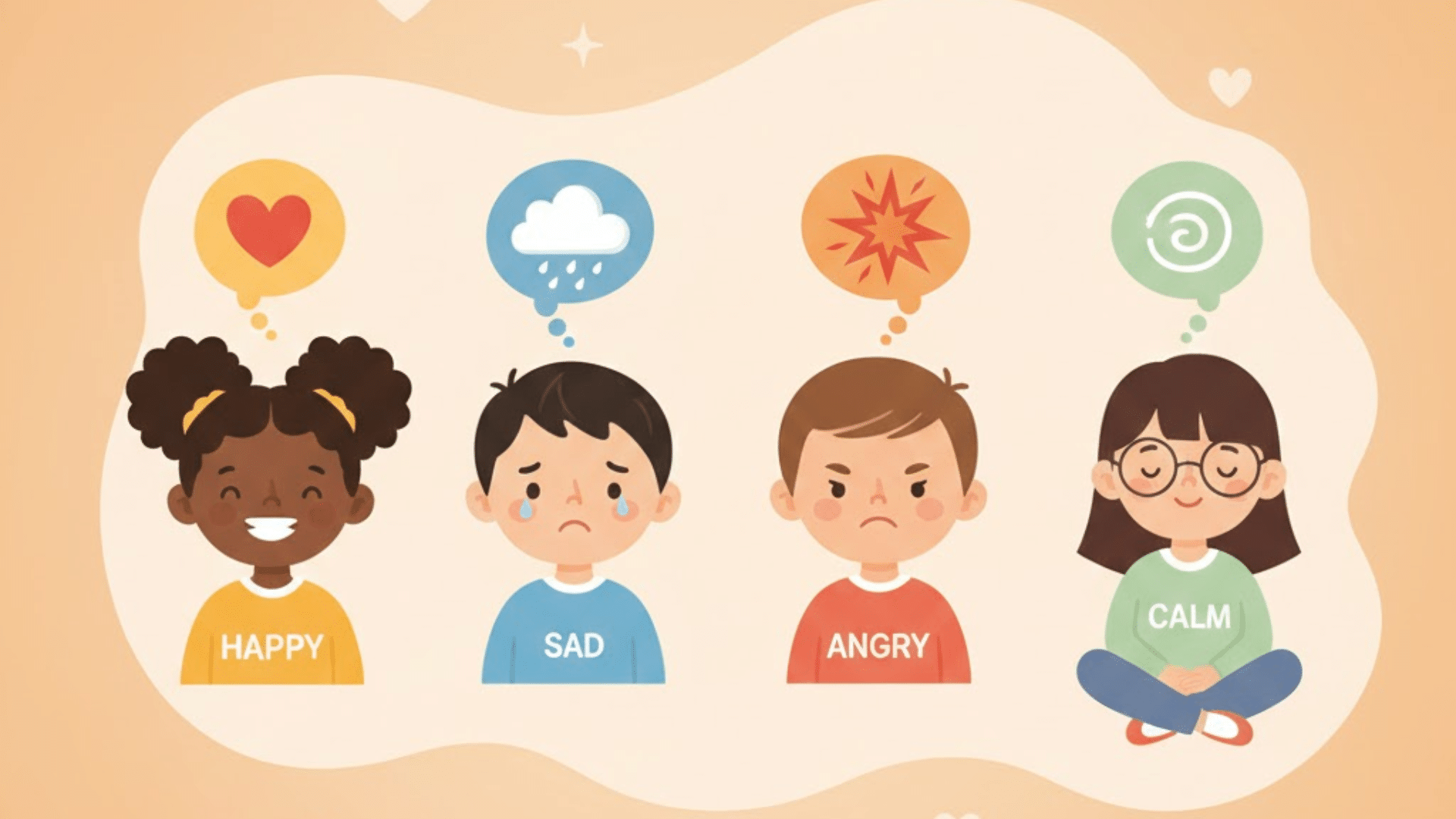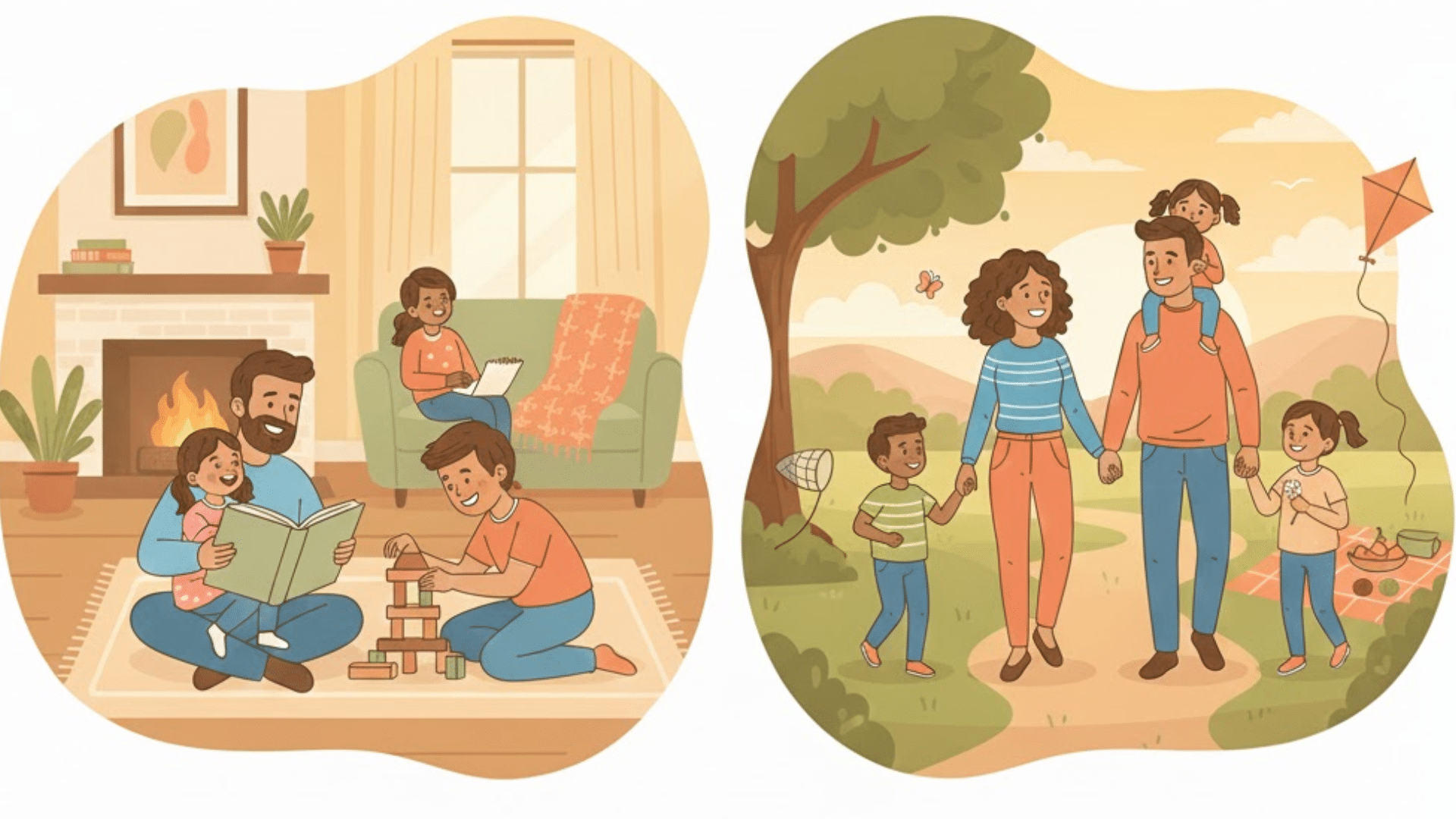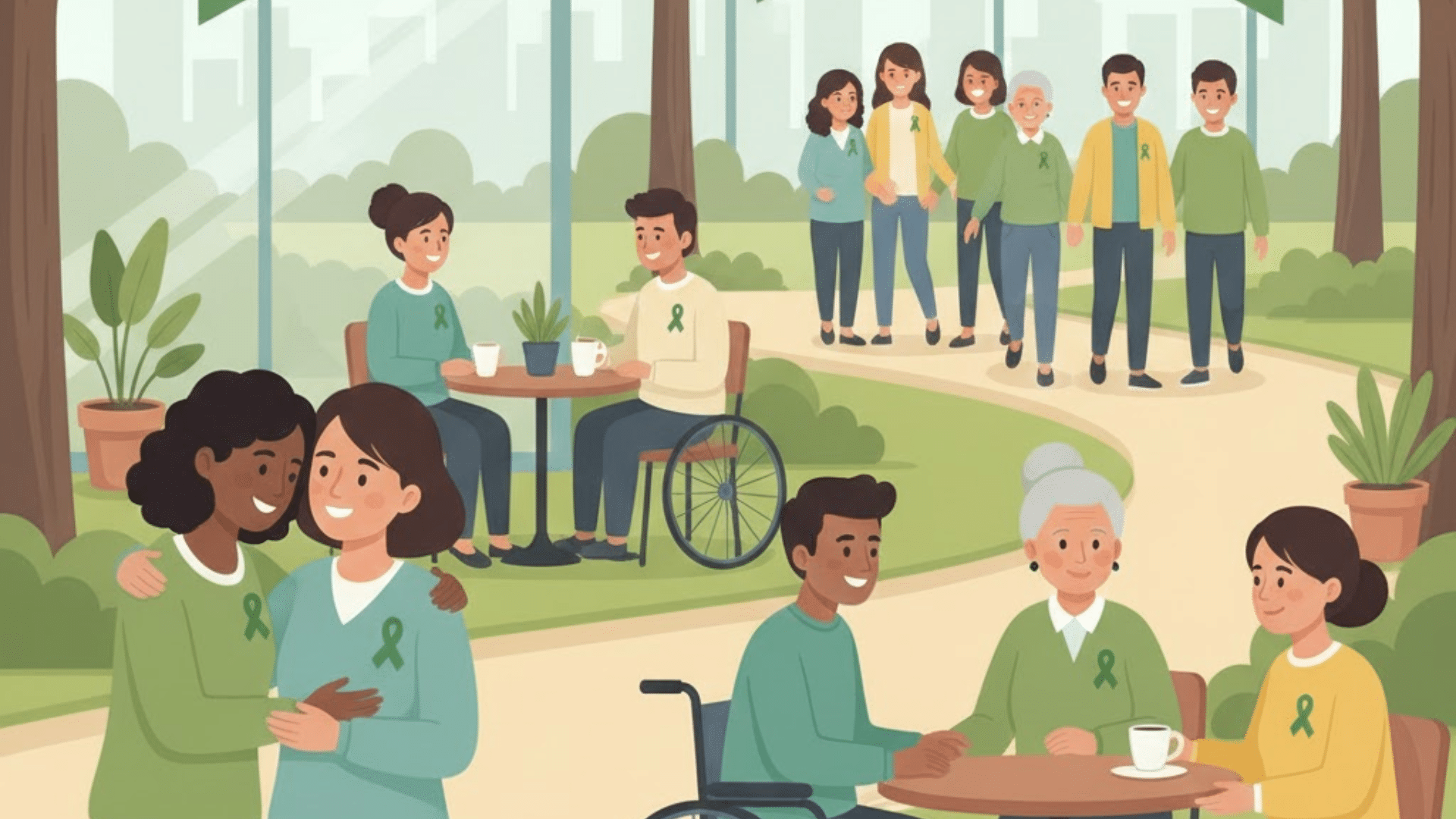Getting kids to help at home can feel like a daily challenge. But chores aren’t just about cleaning – they’re about teaching children responsibility, teamwork, and independence. Parents often ask: Which chores are right for my child’s age?
This blog gives you clear answers. You’ll find chore lists for kids from toddlers to teens, along with ideas to keep them motivated. I’ll cover tips from experts and real-life strategies from parents.
By the end, you’ll have practical tools to assign age-appropriate chores that actually stick.
The Value of Chores for Children
Chores do more than keep the house clean – they help kids grow into responsible, capable adults. When children take on tasks at home, they learn that their effort matters.
Even small jobs like picking up toys or setting the table teach them teamwork and self-reliance.
Chores also build important life skills. Kids learn how to manage time, solve problems, and complete tasks without giving up.
These skills carry into school, friendships, and later into work. Taking responsibility at home boosts confidence because children see the results of their effort right away.
Starting with age-appropriate tasks and increasing responsibility over time helps children build lasting habits. Chores are simple, everyday lessons that prepare them for the future.
Introducing Chores Gradually to Kids
Start by listing all the tasks it takes to keep your household running. Let each child choose the chores they’d like to take on, making sure everyone has age-appropriate responsibilities.
- Give clear instructions: Instead of saying, “Clean your room,” break it down into specific steps like: put clothes in the closet, books on the shelf, dishes in the kitchen, and toys in the toy box.
- Introduce chores gradually: First, demonstrate the task step by step. Then, let your child help you. Next, supervise them as they do it. Finally, once they’ve mastered it, let them handle it independently.
- Keep reminders simple: Avoid constant nagging or strict deadlines. Use the “when/then” method – e.g., “When the pets are fed, then you can have your dinner.
Create a chart with three columns: one for the chore and the person responsible, one for the deadline, and one for check marks when the task is complete.
Chore Lists For Kids by Age Group
Children need age-appropriate tasks to build confidence. Giving them chores that match their stage helps them learn responsibility without feeling overwhelmed.
Some chores will stay the same across age groups, while others will be repeated with added steps or enhanced responsibilities as kids grow.
Chores for Toddlers (Ages 2–3)
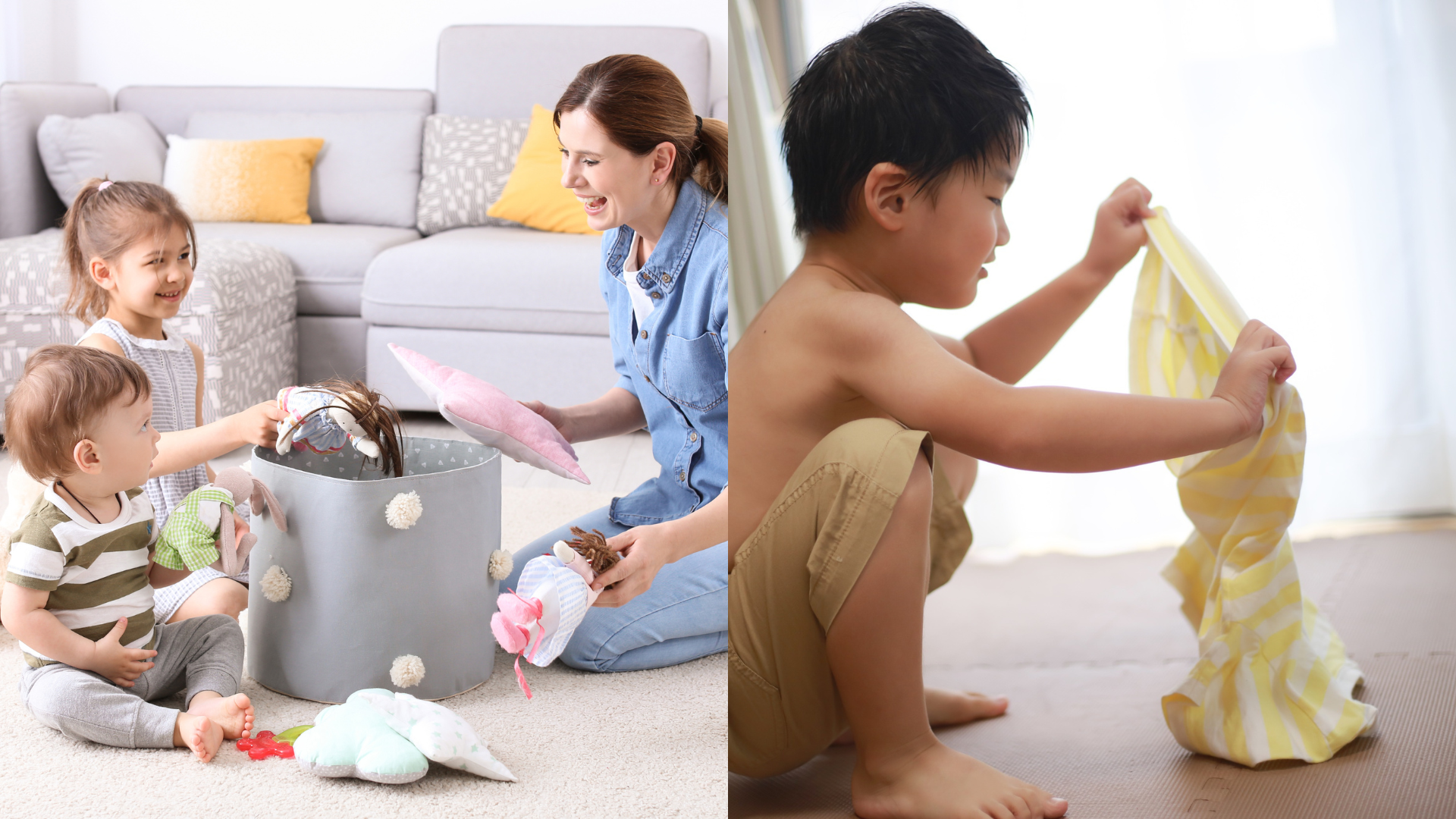
At this age, chores should be short, simple, and playful. Kids can copy what you do and feel proud when they help.
- Pick up toys – Place toys back in bins with gentle reminders.
- Put dirty clothes in the basket – Drop laundry in the hamper after changing.
- Wipe spills – Use a small cloth for small messes.
- Help feed pets – Scoop kibble or pour water with supervision.
- Throw away trash – Put small papers or wrappers in the bin.
- Stack books – Place books on a low shelf neatly.
- Dust with a sock – Wipe furniture with a sock on hand.
- Carry light groceries – Help bring in small, safe bags.
- Water plants with help – Hold a small cup to water plants.
- Match socks – Find and pair similar socks during laundry.
- Push in chairs – Tuck chairs under the table after meals.
- Help put pillows on the bed – Place pillows while you make the bed.
Chores for Preschoolers (Ages 4–5)
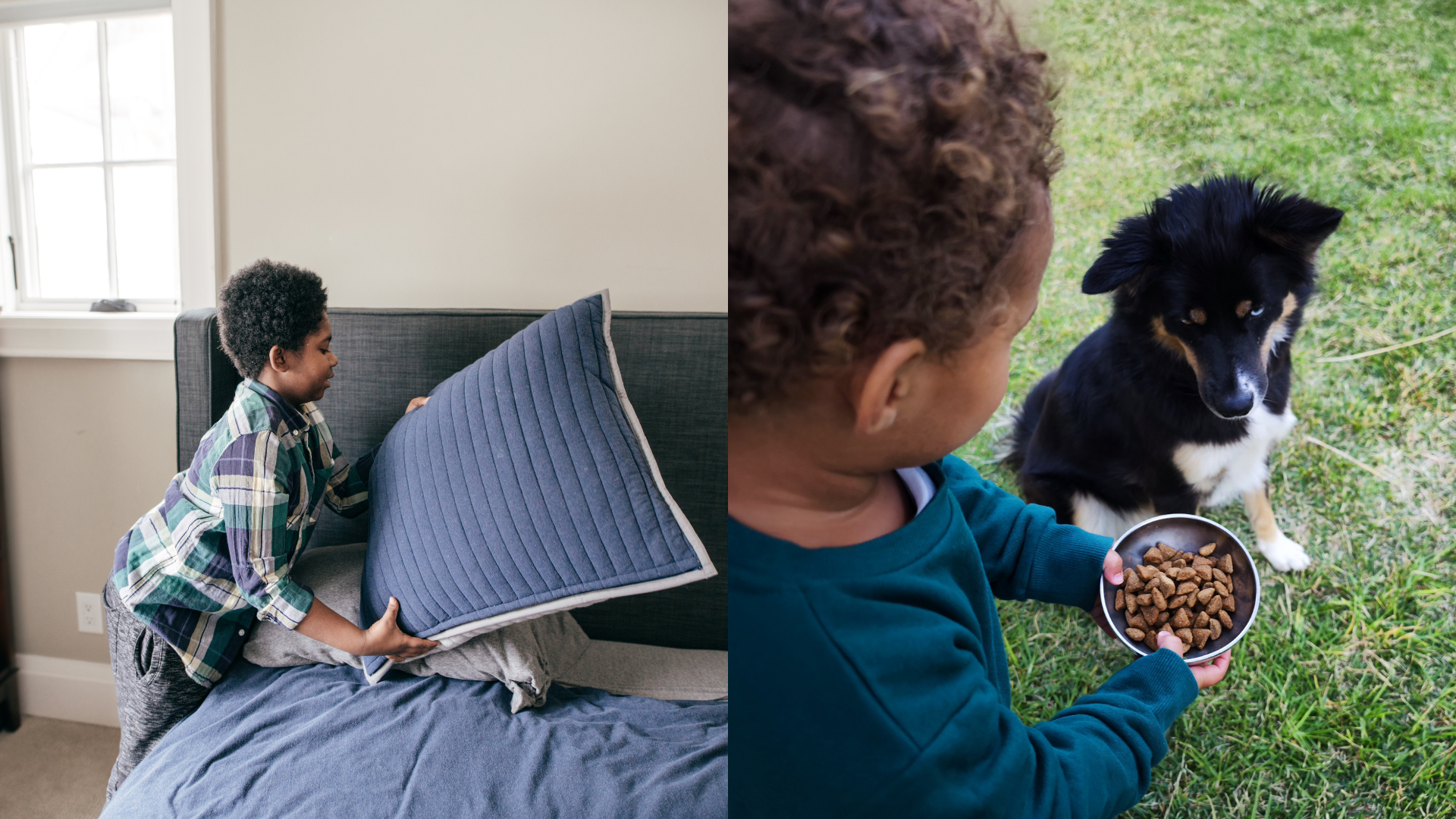
Preschoolers are eager to help and enjoy feeling useful. Simple household chores give them a sense of importance.
- Make the bed – Pull up the blanket and place the pillows neatly.
- Set the table – Lay out forks, spoons, and napkins before meals.
- Feed pets – Measure food or refill water bowls with supervision.
- Help water plants – Pour water into pots using a small pitcher.
- Put away toys – Sort blocks, cars, and dolls into bins.
- Clear table – Carry plates and cups to the sink.
- Help with groceries – Carry light items and place them on shelves.
- Match and fold small laundry – Pair socks and fold washcloths.
- Wipe the table – Use a cloth to clean after meals.
- Pick up sticks in the yard – Collect small sticks or leaves outside.
- Help pack snacks – Put fruit or crackers into small bags.
- Dust low furniture – Use a cloth to wipe tables and chairs.
These small tasks teach responsibility and teamwork at home.
Chores for Early Elementary (Ages 6–8)

By this stage, kids can handle chores that require more focus. They enjoy being trusted with “big kid” tasks.
- Fold laundry – Towels, T-shirts, and socks folded neatly.
- Sweep floor – Use a broom for the kitchen or playroom.
- Help pack lunch – Add snacks, fruit, or sandwiches to boxes.
- Take out recycling – Carry paper or plastic to outside bins.
- Help cook simple meals – Stir, wash vegetables, or mix batter.
- Vacuum small areas – Handle a lightweight vacuum for one room.
- Put away groceries – Sort items into fridge and pantry.
- Help wash the car – Rinse and wipe with a soft cloth.
- Make simple snacks – Prepare cereal, toast, or fruit salad.
- Feed and brush pets – Refill bowls and gently brush fur.
- Help with dishes – Rinse plates or load dishwasher safely.
- Clean own room – Tidy bed, toys, and desk area daily.
Giving them regular chores builds confidence and consistency.
Chores for Preteens (Ages 9–12)
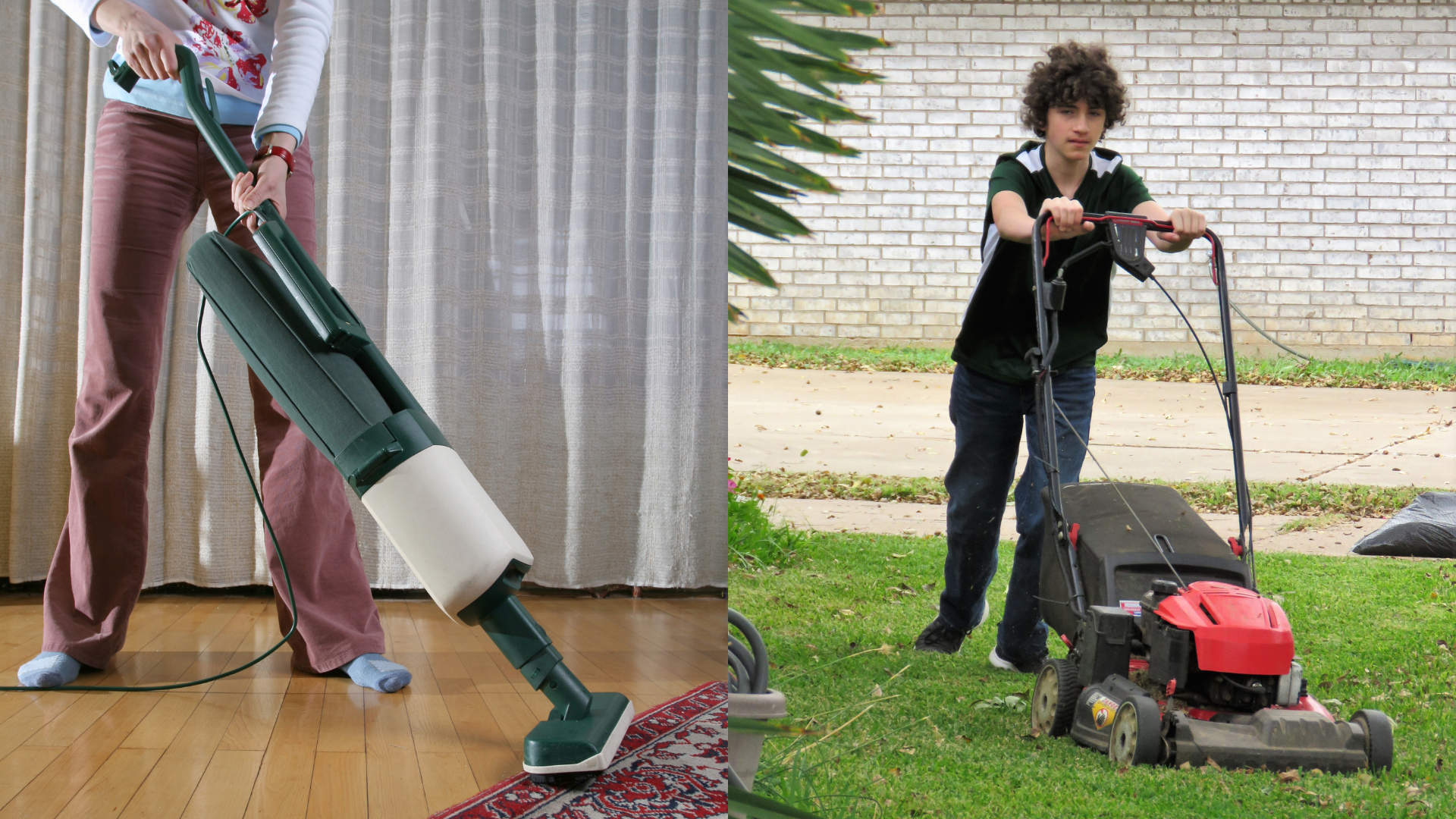
Preteens can manage chores that require more effort and independence. These tasks prepare them for teenage years.
- Vacuum floors – Cover bedrooms, living room, or hallways.
- Load dishwasher – Place dishes properly and add detergent.
- Take out trash – Collect and empty bins into outside cans.
- Cook simple meals – Make pasta, eggs, or sandwiches safely.
- Do laundry – Wash, dry, fold, and put away clothes.
- Mow small lawn areas – Push mower with safety rules.
- Clean windows – Spray and wipe glass with supervision.
- Walk pets – Take dogs on short supervised walks.
- Organize closet – Sort clothes, shoes, and accessories neatly.
- Wash the car – Scrub, rinse, and dry with guidance.
- Help paint or repair – Assist with simple household projects.
- Babysit briefly – Watch younger siblings while parents are nearby.
This age group benefits from clear expectations and steady routines.
Chores for Teens (Ages 13–18)

Teenagers are capable of handling almost all household responsibilities. Giving them real tasks teaches life skills.
- Mow lawn – Maintain front and backyard regularly.
- Do laundry – Handle washing, drying, folding, and ironing.
- Babysit siblings – Supervise younger children responsibly.
- Grocery shopping – Shop with a list and manage budget.
- Cook family meals – Plan, prepare, and serve dinner.
- Clean bathrooms – Scrub sinks, showers, and toilets.
- Tutor younger siblings – Help with homework, projects, or studying for school tests.
- Help with deep cleaning – Mop floors, dust, and vacuum thoroughly.
- Wash and maintain the car – Clean, check oil, and refill the washer fluid.
- Yard work – Rake leaves, shovel snow, or trim hedges.
- Plan and manage schedule – Keep track of personal and school chores.
- Assist with bills or errands – Pay small bills or run errands.
At this stage, chores help prepare them for adulthood.
How to Motivate Kids to Do Chores
Getting kids to stick with chores can be tricky. The key is to make the process rewarding, enjoyable, and consistent.
Some parents connect chores with rewards or allowance. Rewards can motivate kids, but chores shouldn’t feel like extra work – small incentives work best alongside shared responsibility.
Kids are more likely to do chores when they don’t feel like doing chores. Turn tasks into games, set small challenges, or play music while cleaning. A playful approach keeps them engaged and helps chores become a natural part of the day.
Chores work best when they’re part of the daily routine. Post a chart on the fridge or in their room as a reminder. Daily check-ins and gentle follow-ups show that chores aren’t optional and help children build lasting habits.
Real-Life Strategies from Parents
In a Reddit thread, one parent wrote:
“Make a list of all the chores everyone does and discuss what is reasonable for everyone.”
That shows parents use shared planning and fairness to reduce resistance.
Another parent said on Reddit:
“If they want their allowance, they have to do the work… I withheld some of his money.”
This shows how allowance is used as motivation – while also enforcing accountability.
On r/ADHD, a user commented:
“We ALWAYS struggle with chores. We can’t keep the house clean / organized for more than a day.”
This reminds us that in households with attention challenges, consistency and adapted strategies matter even more.
Some parents rotate chores weekly to keep things fair, while others use time limits or fun challenges to make tasks more manageable.
Conclusion
Chores are more than daily tasks – they’re tools that teach kids confidence, responsibility, and teamwork.
By using age-appropriate chore lists, you can guide children from simple habits in toddler years to life skills in their teens. Routines and small rewards help make the process smoother and more consistent.
Now it’s your turn. Choose a few chores that fit your child’s age and start building those habits today.
Share this blog with other parents who could use a little help getting kids involved at home.



